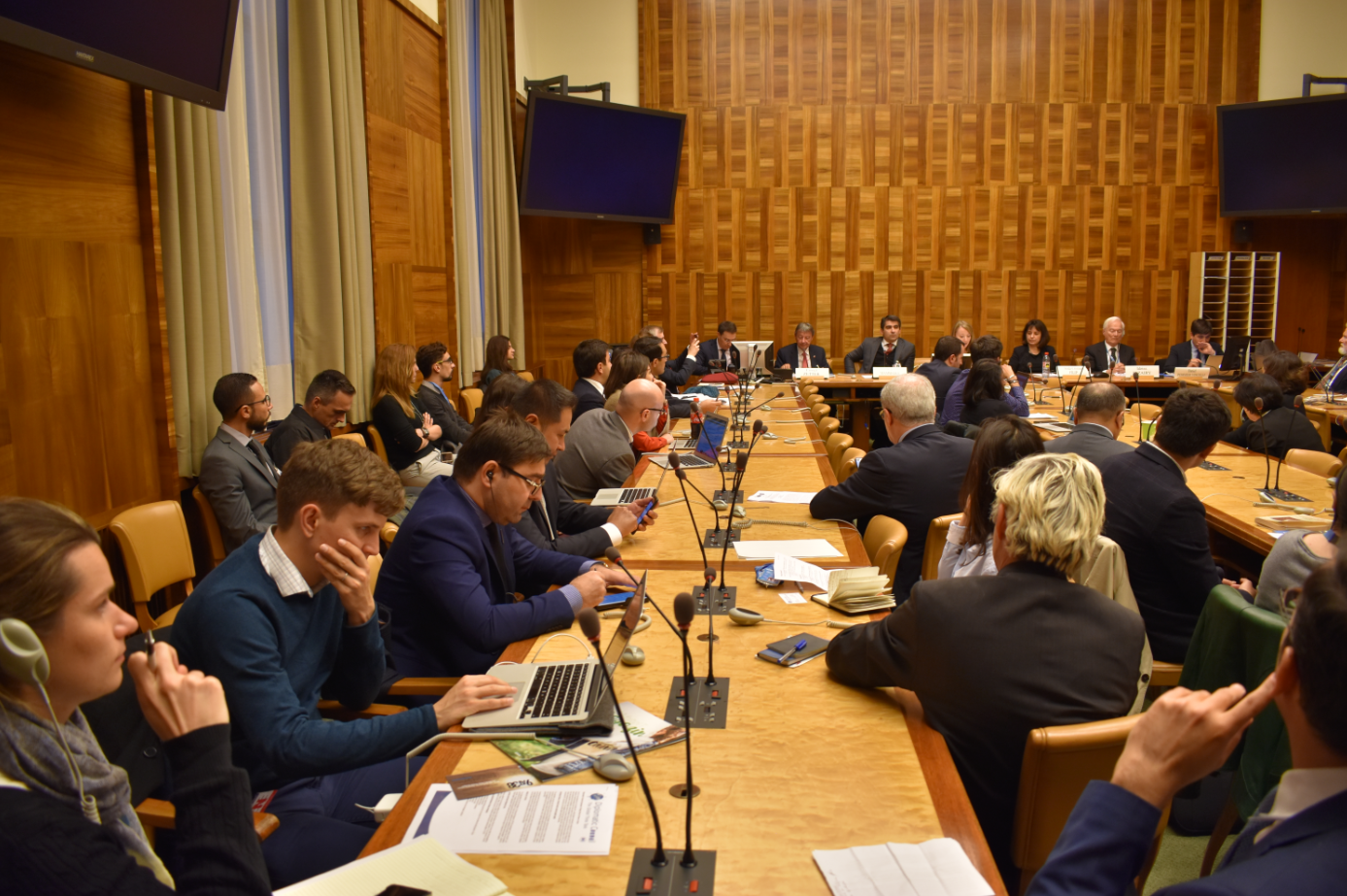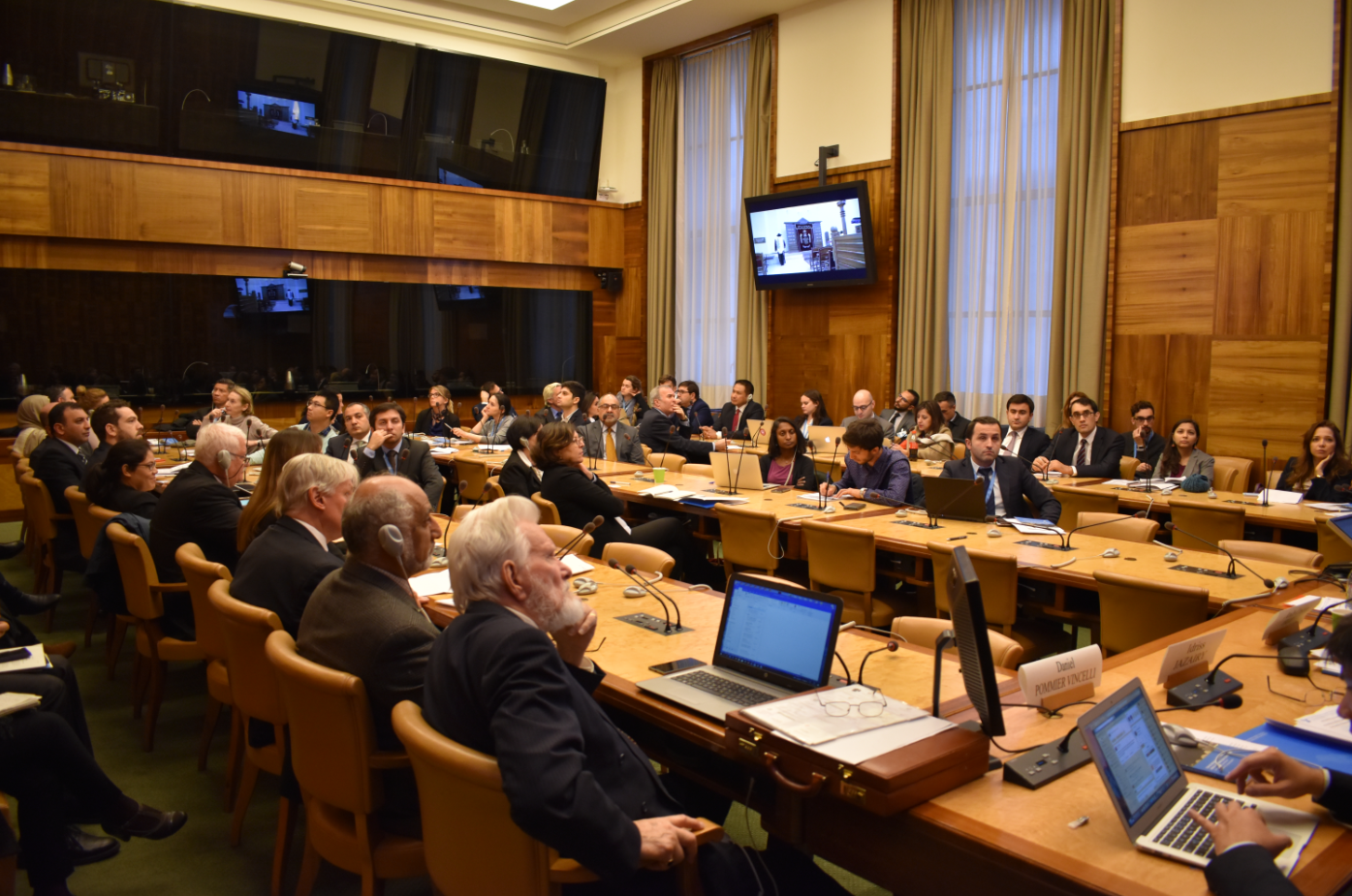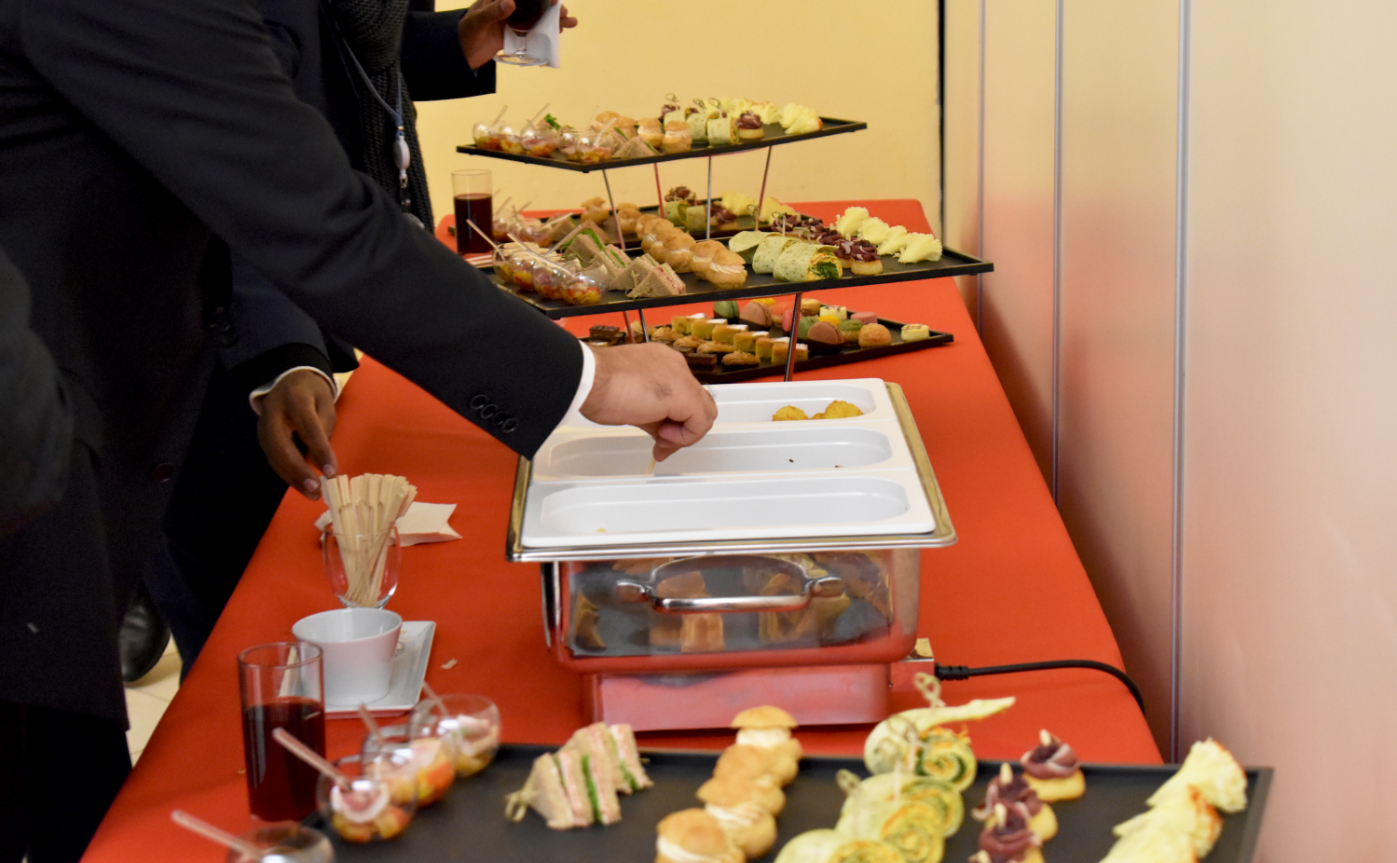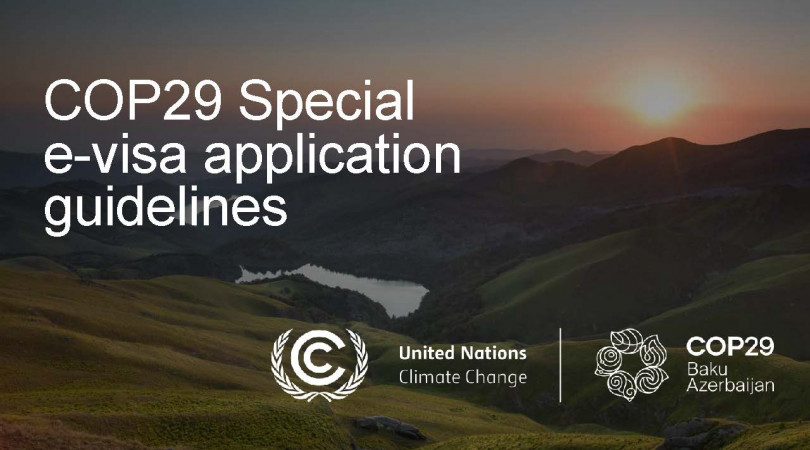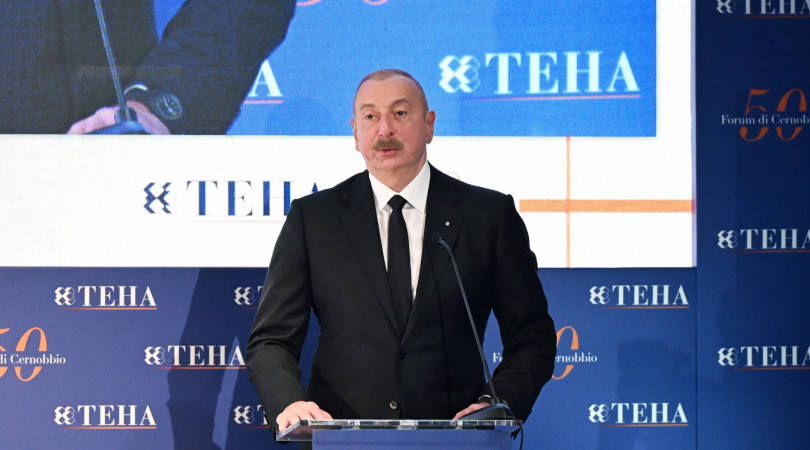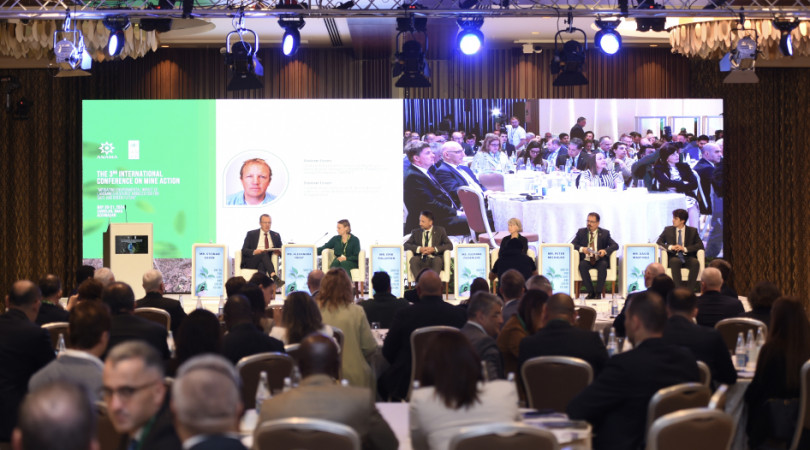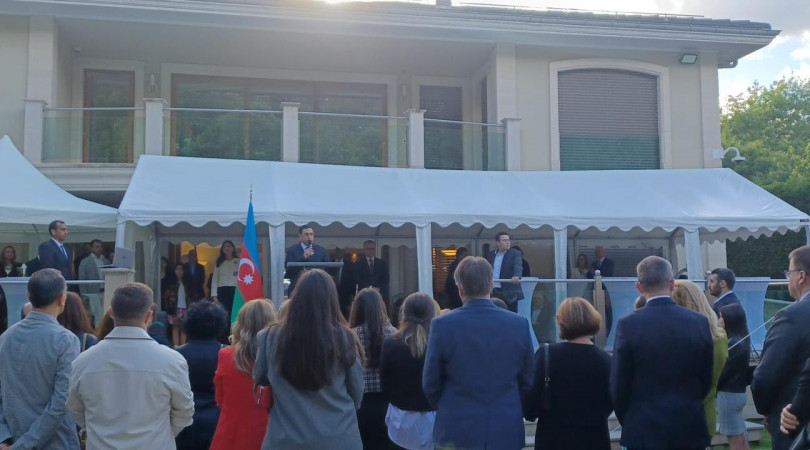Geneva Peace Week - "Preventing Conflicts Through Intercultural Dialogue – The Example of Azerbaijan"
The Azerbaijani concept of intercultural, inter-religious dialogue has been upheld as a model for other countries during a conference held in the Palais de Nations at the UN Office in Geneva as part of a series of events organised under the framework of the Geneva Peace Week. The event on 7 November was organised by the French office of The European Azerbaijan Society Foundation (TEAS), the State Committee for Work with Religious Organisations of the Republic of Azerbaijan, and the Azerbaijani Permanent Mission to the UN Office and other International Organisations in Geneva. The Conference entitled Preventing Conflicts Through Intercultural Dialogue – The Example of Azerbaijan attracted more than 70 delegates, including numerous Ambassadors, together with representatives of various diplomatic missions, NGOs, research institutions and international organisations.
Taking into account the increasingly tense and polarised nature of the contemporary world, which is riven by conflicts according to religious and ethnic lines, the example of Azerbaijan – located at the intersection between Asia and Europe – was cited as a model. Since ancient times, Azerbaijan has been inherently tolerant, and multiculturalism is now a state policy. Reflecting this, the Azerbaijani government has organised the Baku International Humanitarian Forums and World Forums on Intercultural Dialogue, which are supported by the UN Alliance of Civilisations (UNAOC), UNESCO and Council of Europe, amongst other organisations.
Baku also played host to the Seventh Global Forum of the UNAOC and its eponymously named Baku Process has advocated international dialogue for nearly a decade. In May this year, it also hosted the fourth biennial Forum on the theme of Advancing Intercultural Dialogue: New Avenues for Human Security, Peace and Sustainable Development.
Baku has also been selected as the host for such international and multicultural events as the Baku2015 European Games (organised under the auspices of the European Olympic Committees) and the Islamic Solidarity Games.
Marie-Laetitia Gourdin, Head, TEAS France, opened the discussions, observing: “Given the very unique aspect of Azerbaijan being a secular country for nearly 100 years, and the peaceful presence of all religious communities on its territory, we have deliberately extended this debate on intercultural dialogue to reflect religious tolerance and diversity.”
Nijat Mammadli, Director for External Relations, Azerbaijani State Committee for Work with Religious Organisations initially screened a short film outlining the inclusive realities of Azerbaijani multiculturalism and inter-religious dialogue, and went on to quote Professor Roy Olivier, European University Institute, Florence, who commented: “Today, Azerbaijan is probably the only country where there are still mixed mosques and Shia and Sunnis pray together.”
Mr Mammadli explained: “Our religious tolerance dates back to the fifth century A.D., when Jews were given land in Guba and, after the Zoroastrian period, Christianity was the state religion of Caucasian Albania. Azerbaijan has always encouraged every faith, and today we see situations where Muslim Azerbaijanis and Christian Georgians pray together, and a new Catholic cathedral has been constructed with state support.
“The background to the Azerbaijani interpretation of Islam is Sufism, which emphasises the need for love, brotherhood and respect for the spirit of common humanity. Despite the ongoing Armenian–Azerbaijani Nagorno-Karabakh conflict, the Armenian Church in Baku still stands and has been restored by the Azerbaijani state. Pope John Paul II visited Baku in 2002, and a new synagogue has been constructed for the Mountain Jews.
“In Azerbaijan, the word ‘tolerance’ is inadequate. We encourage inter-religious dialogue and, despite the Shia:Sunni split being 65:35, a poll indicated that only 1 per cent considered there to be any tension between these forms of Islam, whereas the divide causes bloodshed in many other countries.”
Lionel Zetter, Director, TEAS, continued: “The Azerbaijani model of secularism, and its peaceful experience of inter-religious dialogue, must be viewed as a unique and successful model – especially in today’s context of globalisation and global threats to security.
“For several years, TEAS has led a number of projects throughout Europe and in Azerbaijan emphasising Azerbaijani religious tolerance and multiculturalism. I should say that, in Azerbaijan, the phrase ‘religious tolerance’ is frowned upon and its use is not encouraged, because it is regarded as being too grudging. Instead Azerbaijanis like to talk in terms of actively celebrating the diversity of religious expression within their society.”
Mr Zetter then recalled his recent visit to Jojug Marjanli – an Azerbaijani region, under the Armenian occupation in the past, liberated during the ‘Four-Day War’ of 2016. He recognised the work undertaken to reconstruct the village, but also the cost in human life, and that this indicates the volatility of the conflict if peace does not prevail.
He continued: “I am honoured to speak about this issue today in the UN, but we must remember that the UN passed four Security Council resolutions condemning the Armenian occupation 24 years ago, and these remain unimplemented. Once this situation is resolved, Armenians and Azerbaijanis can again live side-by-side.”
Dr Daniel Pommier Vincelli, Researcher and Adjunct Professor, Sapienza University of Rome, observed: “During the period of the Azerbaijan Democratic Republic (ADR) (1918–20), representatives of the so-called ‘Caucasian Azerbaijan’ tirelessly advocated for the international community to recognise Azerbaijani independence. At that time, Nagorno-Karabakh was not Armenian, Azerbaijani or Russian, as the modern concept of a state did not exist.
“It is incorrect for Armenia to state that Nagorno-Karabakh has ‘returned’ to its jurisdiction. The situation arose in the mid-1960s when ethnic nationalism arose in Armenia. This became apparent in the late 1980s, as it became clear that the Soviet Union was on the brink of collapse.”
Ambassador Anda Filip, Director for Member Parliaments and External Relations at the Inter-Parliamentary Union (IPU), said: “During my visit to Baku, I was impressed by the combination of tradition and modernity. Azerbaijan has balanced respect for diversity and ensures equality. All sectors of the population can fully express themselves, and discrimination has been eliminated. Diversity must be reflected throughout society, and intercultural dialogue and co-operation must be encouraged.”
She continued: “The IPU firmly believes in political dialogue and co-operation amongst MPs of different backgrounds and beliefs as a way to forging understanding and building a more peaceful world. As the world becomes increasingly interconnected and interdependent, mutual respect, understanding and co-operation across cultural divides have become imperative. This was the focus of the St Petersburg Declaration on cultural pluralism and peace through interfaith and inter-ethnic dialogue, agreed at the 137th IPU Assembly in October.”
Ambassador Idriss Jazairy, Executive Director, Geneva Centre for Human Rights Advancement and Global Dialogue, stated: “During the 2017 International Humanitarian Forum, held in Baku, Azerbaijani President Ilham Aliyev remarked that diversity is under threat. He declared that: “The rise of xenophobia, discrimination, racism, islamophobia and antisemitism around the world ‘are extremely dangerous trends.’ They require – he observed – the utmost attention of global decision-makers. I echo his views that xenophobia, bigotry and racism must not gain more ground in the 21st century. Diversity and inclusion must not be replaced by fear, hate and exclusion.”
Ambassador Jazairy reiterated that the Geneva Centre remains inspired by the efforts of Azerbaijan to promote peaceful, friendly relations among nations at a global level. He continued: “Our initiative very much follows in the footprints of the 2008 Baku Process for the promotion of intercultural dialogue initiated by President Aliyev. The Azerbaijani vision to promote open and inclusive dialogue between peoples and nations unites us in our spirit and in our moral obligations to stand up to injustice.”
The event concluded with a lively question-and-answer session covering such topics as religious education, highlighting the study by both Shias and Sunnis in the Baku Islamic Academy, the work of the Jewish School in Baku and the illegality of the Armenian state occupying Nagorno-Karabakh following ethnic cleansing.
The discussions evoked how the Azerbaijani tradition of intercultural dialogue and religious tolerance can be a tool to support the peaceful resolution of the Armenian–Azerbaijani Nagorno-Karabakh conflict. Two examples were mentioned, the first of which is the Armenian–Azerbaijani Peace Platform, launched in 2016. This is now developing with support from many civil society representatives in countries beyond Armenia and Azerbaijan. Their actions are led by this simple motto “We used to live and we will live together!” Secondly, three spiritual leaders of the Caucasus region (Armenia, Azerbaijan and Russia) recently issued a joint statement expressing their collective: “Readiness to defend the peacekeeping initiatives to resolve the Nagorno-Karabakh conflict.”
PHOTOS
VIDEO
